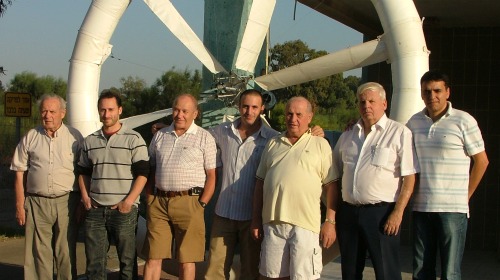Two Israeli companies are among the five winners of General Electric’s Ecomagination Challenge to develop ideas for better power grid and global energy transformation.

Thousands of entries poured in from entrepreneurs in 150 countries when General Electric announced its $200 million GE Ecomagination Challenge last July. Ten weeks later, judges announced five winners: Three from the United States and two from Israel. Each received $100,000, no strings attached, to develop their ideas for creating a smarter, cleaner, more efficient power grid and global energy transformation through open collaboration.
The two Israeli awardees are GridON of Givatayim, whose “Keeper” fault-current limiter protects the electric grid from disruptions and power outages; and WinFlex of Kiryat Yam, whose wind turbine rotors made from light, flexible and inexpensive composite fabric, reduce installation costs by at least half.
“We launched the Challenge to encourage new thinking and spur innovation at every level of development,” says Beth Comstock, senior vice president and chief marketing officer for GE. “The first step toward modernizing our grid is to uncover ideas and transform them into game-changing technologies and the Challenge has demonstrated that many great ideas exist out there.”
GridOn stops fault currents from spreading
GridOn CEO Yoram Valent says he had reached out to GE last spring when his company was ready to commercialize the Keeper. “We are targeting utility markets,” he tells ISRAEL21c. “GE would be one of our natural partners and potential manufacturers.” Shortly afterward, he learned of the call for applicants to Ecomagination.
The three-year-old company’s product keeps fault currents from spreading through the power grid, enabling uninterrupted service and protecting capital equipment from damage. The Keeper is expected to save grid operators millions of dollars by avoiding regulatory penalties, lowering operating costs and increasing the lifespan of costly infrastructure.
The core technology was developed by a team of scientists almost seven years ago in the Physics and Magnetics Lab of Bar-Ilan University, in cooperation with RICOR Vacuum and Cryogenic Systems at Kibbutz Ein Harod. It was exclusively licensed to GridON by BIRAD, the university’s transfer company. Valent, a high-tech startup veteran and former vice president of California semiconductor manufacturer Marvell Technology Group, partnered in GridOn with software developer Roy Iscovitsch and investment banker Matty Vengerik.
“We are now working with Wilson Transformer, a shareholder and partner, on making this exciting technology available around the world,” Valent says. “Wilson is also our contractor for building this heavy piece of equipment, out of Australia. We are engaged in advanced discussions with utilities in Western Europe and North America and expect to enter production in the first half of 2011.”
At the award banquet in California, Valent mingled with GE executives and the media. “I can tell that already our exposure within GE has reached its global research center and some senior groups have started to look more seriously into what we do.”
WinFlex develops unique wind turbine technology
Though the company is less than three years old, the technology behind WinFlex, a start-up that develops and implements a unique wind turbine technology for manufacturing wind turbines and licensing its technology for mass production, was developed by Dr. Vladimir Kliatzkin some 30 years ago.
His 29-year-old son, Eliezer, took the initiative to bring the product to market. “I asked my father’s permission to do this,” Eliezer tells ISRAEL21c in a phone conversation from California shortly after the Ecomagination winners were announced. “I grew up in the project and I have a background in computers and physics.”
He gathered a team of 15 engineers who had worked together previously, mostly immigrants from the Former Soviet Union like his father. “This project is mainly based on their experience in the space and aeronautical industry as well as energy storage and the production sector.”
With financial and administrative aid from the Office of the Chief Scientist at Israel’s Ministry of Industry, Trade and Labor, which oversees government-sponsored support of R&D in Israeli industry, WinFlex is designing a medium-scale prototype to be completed by the end of next year. Potential customers are already lined up.
“At the R&D stage, the entrepreneur hears ‘no’ many times and ‘yes’ only a few times. When the ‘yes’ comes from an authority like GE, I believe it will have an impact,” Kliatzkin declares. “It can be very hard to convince someone that it is possible to develop a breakthrough concept in Israel, and there is endless bureaucracy to deal with. Recognition from a major player like GE makes it clear that we are for real. Secondly, it opens a door for us to the financial resources available for a project like this.”
The five innovation awardees were selected by an independent panel of judges including Wired magazine editor Chris Anderson, GE executives and leading academics and technologists. The other three winning ideas were intelligent water meters by Capstone Metering of Texas; a secure communications network for the electric grid by ElectricRoute of New Hampshire; and a wind turbine blade anti-icing and de-icing technology by IceCode, New Hampshire.













